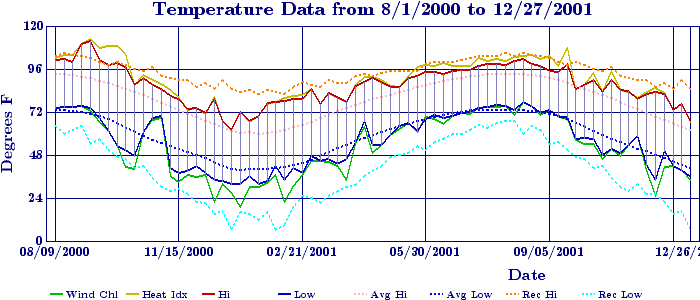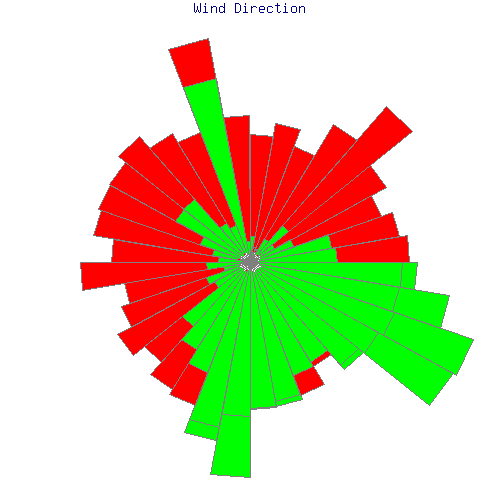
For examples, go to my weather page.
Addon to GDGraph to create Rose Diagrams for displaying wind direction.
Here is what the test routine outputs

Here is a tarball with most of my working code in it, as described below.
Here is an example of the output :

Here is the encoding for the WMR918 :
Protocol for the Oregon Scientific WMR-918 weather station 7/21/2000 Alan K. Jackson (weatherman@ajackson.org) This document is placed under GPL. Please feel free to use and abuse it, but give me credit for puzzling it out. Thanks! Thanks to the creators of the WX200 protocol document. I have tried to follow their format in preparing this document. The data stream reacords are directly tied to the sensors themselves, and probably represent, at least for the most part, the raw data as it is received by the weather station. Most (all?) quantities calculated by the weather station are not in fact sent down the RS-232 port. Records are separated by a 2-byte field of all one's (FFFF). There are 5 record types. The first byte in each record is the type flag. Byte Nibble Bit(s) Datum Description 'part' of lo<format<hi unit @ resolution 00. 0 HH all Group 00 ------------------------------------------------- 00. 1 ?? ??? Wind ????????? unknown 00. 2 DD all Wind Gust Dir 'bc' of 0<abc<359 degrees @ 1 00. 3 xD all Wind Gust Dir 'a' of 0<abc<359 degrees @ 1 00. 3 Dx all Wind Gust Speed 'c' of 0<ab.c<56 m/s @ 0.2 00. 4 DD all Wind Gust Speed 'ab' of 0<ab.c<56 m/s @ 0.2 00. 5 DD all Wind Avg Speed 'bc' of 0<ab.c<56 m/s @ 0.2 00. 6 xD all Wind Avg Speed 'a' of 0<ab.c<56 m/s @ 0.2 00. 6 Bx 3 Wind Sign of wind chill, 1 = negative 00. 7 DD all Wind Wind chill 'ab' of -85<ab<60 deg C @ 1 00. 8 HH all Cksum unsigned sum of first 8 bytes +2 01. 0 HH all Group 01 ------------------------------------------------ 01. 1 ?? ??? Rain ????????? unknown 01. 2 DD all Rain Rate: 'bc' of 0<abc<999 mm/hr @ 1 01. 3 xD all Rain Rate: 'a' of 0<abc<999 mm/hr @ 1 01. 3 Dx all Rain Bucket tips since ? 01. 4 DD all Rain Total: 'cd' of 0<abcd<9999 mm @ 1 01. 5 DD all Rain Total: 'ab' of 0<abcd<9999 mm @ 1 01. 6 DD all Rain Yesterday: 'cd' of 0<abcd<9999 mm @ 1 01. 7 DD all Rain Yesterday: 'ab' of 0<abcd<9999 mm @ 1 01. 8 DD all Rain Total Reset: Minutes 01. 9 DD all Rain Total Reset: Hours (0<aa<24) 01.10 DD all Rain Total Reset: Day 01.11 DD all Rain Total Reset: Month 01.12 DD all Rain Total Reset: Year 01.13 HH all Cksum unsigned sum of first 13 bytes +2 03. 0 HH all Group 03 ------------------------------------------------ 03. 1 ?? ??? Outdoor ????????? unknown 03. 2 DD all Outdoor Temp 'bc' of -50<ab.c<70 deg C @ 0.1 03. 3 xD all Outdoor Temp 'a' of -50<ab.c<70 deg C @ 0.1 03. 3 Bx 3 Outdoor Temp sign bit. + if 0, - if 1 03. 4 DD all Outdoor Humidity 'ab' of 2<ab<98 % RH @ 1.0 03. 5 DD all Outdoor Dewpoint 'ab' of 0<ab<56 deg C @ 1.0 03. 6 HH all Cksum unsigned sum of first 6 bytes +2 05. 0 HH all Group 05 ------------------------------------------------ 05. 1 ?? ??? Indoor ????????? unknown 05. 2 DD all Indoor Temp 'bc' of -50<ab.c<70 deg C @ 0.1 05. 3 xD all Indoor Temp 'a' of -50<ab.c<70 deg C @ 0.1 05. 3 Bx 3 Indoor Temp sign bit. + if 0, - if 1 05. 4 DD all Indoor Humidity 'ab' of 2<ab<98 % RH @ 1.0 05. 5 DD all Indoor Dewpoint 'ab' of 0<ab<47 deg C @ 1.0 05. 6 HH all Indoor Barom P 'ab' of 795<ab+cde<1050 mb @ 1.0 05. 7 xB 1,2 Forecast: C=Sunny, 6=Partly Sunny, 2=Cloudy, 3=Rain 05. 7 ?x ??? unknown 05. 8 Dx all Indoor Barom P 'c' of 795<ab+cde<1050 mb @ 1.0 05. 8 x? all Indoor Barom P unknown 05. 9 DD all Indoor Barom P 'de' of 795<ab+cde<1050 mb @ 1.0 03.10 HH all Cksum unsigned sum of first 10 bytes +2 0E. 0 HH all Group 0E ------------------------------------------------ 0E. 1 DD all Time Minutes field from time display 0E. 2 HH all Cksum unsigned sum of first 2 bytes -2 0F. 0 HH all Group 0F ------------------------------------------------ 0F. 1 DD all Date ??????????? unknown 0F. 2 DD all Date Hour 'ab' of 0<ab<23 hours @ 1 0F. 3 DD all Date Month 'ab' of 1<ab<12 months @ 1 0F. 4 DD all Date Day 'ab' of 1<ab<31 days @ 1 0F. 5 DD all Date Year 'ab' of 0<ab<99 Year @ 1 0F. 6 HH all Cksum unsigned sum of first 2 bytes -2 Note: c and bb of barometric pressure get revised by sealevel adjustments. ============================================================================= Nibble Column : D -> 4 bit decimal number Range 0-9 H -> 4 bit hex number Range 0-15 B -> Bit encoded value x -> not defined in this entry Bits column : Bits within defined Nibbles 0 - Lo order 3 - Hi order All data sent in units shown and is independent of the units selected. Data sent 9600 baud, 8n1. Cksum : Last byte in each group is a checksum of that group. It is calculated by performimg an unsigned add of all the bytes in the group including the group number, excluding the checksum itself, and subtracting 2 from the result. The checksum is the low order byte of the sum. The date field (0F) only gets sent if the chime is set 'on' on the base unit. Credits : I had gotten about 90% of the decoding done when I found John Stanley's webpage with his decoding and software. I have incorporated a few things that John worked out, but have left mine in where we disagree. John Covert also posted a note decoding the Forecast byte.
This set of tools has evolved, rather than been designed, and it probably shows. It is a fairly complex system, but seems to work and be fairly robust.
Input :
Input (for me) comes from a WMR918 weather station. I run "weather_clean -p" in a window, and it traps all the output and logs it into archive files. I generally have to restart it only when power goes away, and when the clocks get reset for daylight savings.
weather_clean uses Weather::Archive to manage the archival files, Weather::Conversions to do units conversions to my chosen units (imperial), and weather_wmr918.pl to do the raw data conversion off the serial port. The structure is peculiar to try to maintain compatibility with MisterHouse. You could, in principle, plug weather_wmr918.pl into MisterHouse and use it to watch over your weather data. Someday I'll set things up so that both the archiving and MisterHouse get the data at the same time.
serial port ---> weather_clean <---> weather_wmr918.pl
<---> Weather::Conversions
---> Weather::Archive ---> archxxxxxxxxxxx
The next step is to do some processing of the raw data, and create a daily summary and cleaned up file.
I look for spikes and remove them, interpolate/average all the measurements to 10 minute intervals, and fix problems like the rain total being reset to zero.
archive file (archxxxxxxxxx) ---> Pack_weather.pl <---> Weather::ReadArch;
<---> Weather::Math
---> pack_4-16-2001
ReadArch just reads the archive file (of course). Most of the real work is in Weather::Math. That is where I do spike detection, interpolation, and the vector functions required for dealing with the wind vectors. Output is a nice daily summary like this :
## date 4/16/2001 ## input file arch987483621 ## rainfall 14:35 0.040 15:05 0.040 15:15 0.080 15:25 0.110 17:05 0.040 17:15 0.040 17:25 0.400 17:35 0.070 17:45 0.120 18:05 0.040 23:25 0.100 ## extrema data TO = 83.8 at 12:35 and 67.5 at 22:18 TI = 72.9 at 19:11 and 70.3 at 14:03 HO = 95.0 at 23:51 and 59.0 at 12:41 HI = 78.0 at 13:12 and 65.0 at 21:23 DO = 73.4 at 14:42 and 59.0 at 15:10 DI = 64.4 at 12:34 and 59.0 at 20:59 BR = 30.0 at 22:22 and 29.9 at 23:59 Heat = 87.2 at 12:10 and 80.3 at 10:00 WC = 84.2 at 12:07 and 64.4 at 15:21 ## other data ## begin time 00:05 ## Time TO TI HO HI DO DI WC Heat BR gust_dir gust_speed avg_dir avg_speed 00:05 76.43 -999.00 -999.00 -999.00 -999.00 -999.00 76.43 -999.00 -999.00 78.0 0.0 78.0 0 .0 00:15 76.11 70.73 76.53 70.00 69.51 60.80 76.11 76.11 29.90 78.0 0.0 78.0 0.0 00:25 75.74 70.79 77.24 70.00 69.80 60.80 75.74 75.74 29.91 78.0 0.0 78.0 0.0 00:35 75.70 70.70 78.00 70.00 68.00 60.80 75.70 75.70 29.91 78.0 0.0 78.0 0.0 00:45 75.70 70.89 78.00 70.19 68.00 60.80 75.70 75.70 29.89 78.0 0.0 78.0 0.0 00:55 75.65 70.74 78.65 70.00 68.00 60.80 75.65 75.65 29.89 78.0 0.0 78.0 0.0
After all that, I'd like to look at the data and see what it looks like. I have several scripts that collect the data from pack files, and using GD::Graph, create plots. These scripts are all similar :
input pack_xx_xx_xxx ---> Temp_plots.pl <---> Weather::ReadPack;
<---> Weather::Climate
<---> GD::Graph::mixed
---> Temperature.png
---> tmaxmin (text file of extrema)
Weather::Climate contains the local climatological norms and supplies them to the plotting program. The numbers all pertain to Houston, Texas.
The main plotting programs are :
All of them have some hardcoded paths that would need to be altered.
To drive all of these from a cron, I have some scripts that run these, gather the outputs, and build web pages.
Make_weather_page - yesterday's weather
Make_weather_past - several days of past weather
Finally, to mirror the web pages out onto my website, I run weex on a cron.
There is also a utility Edit_packfiles.pl that can be used to set chunks of measurements in the pack files to undefined. This is good when your batteries die and you record garbage for a few days. 8-)